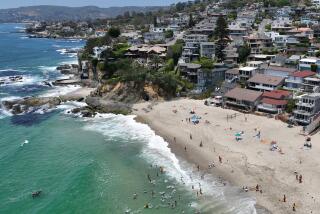Ban on Alcohol at Beaches Lifted
The controversial ban on drinking alcohol at San Diego’s beaches has been suspended after being on the books only 17 hours because of petitions filed by the “Ban the Ban” committee to overturn the ordinance.
The petitions, with more than 45,000 signatures, were filed with the city clerk’s office late Wednesday. Under referendum law, the ordinance prohibiting alcohol at the beaches is automatically suspended until election officials determine whether the petitions include enough valid signatures of registered voters.
Officials have 30 days to verify the petition signatures, which will cost the city about $3,000, said Joyce Lane, an elections analyst in the city clerk’s office.
But that’s just the beginning of what could be a costly tab. If officials decide that at least 28,293 signatures are valid, the issue will be kicked back to City Council, which has two choices: rescind the ordinance or set a citywide referendum election within 11 months.
Officials could choose to expand the Sept. 17 City Council primary election held in four council districts, or half the city, and include the referendum--a move that would cost about $450,000, Lane said. Or, the council could rescind the ordinance and put it on the general election ballot in June 1992, 13 months from now. This action would cost about $50,000, Lane said.
Under similar situations in the recent past, the council has opted to drop an ordinance and leave it at that. In 1990, referendum petitions were filed to block the proposed extension of California 56 through North City West, and a year before that petitions were filed to stop development around Miramar Lake. In both cases, the City Council simply rescinded its ordinances and did not put the issues on the ballot.
Whatever the council decides to do, it won’t dim the delight of opponents who regarded the latest development in the beach-drinking controversy as a clear victory.
“We felt the City Council was not in tune with the people. They were listening to special interest groups, (like) the people who live there (near the beach),” said Linda Jo Hardison, a leader of “Ban the Ban” who runs a La Jolla convenience store that sells beer and wine. “We felt a total ban was overkill.”
In its efforts to collect more than 45,000 signatures, the “Ban the Ban” Committee hired professional petitioners at a cost of about $30,000, money raised from the beer and wine industry as well as individual shop owners and residents.
At City Hall, the impact of the petitions was still reverberating Thursday.
Mayor Maureen O’Connor will be “urging her colleagues to reconsider and dump the ban,” said her spokesman, Paul Downey.
Reiterating a long-held position of ban critics, he said: “We have laws on the books (to handle drunken rowdiness). The issue is enforcement, not having more laws. Adding another law isn’t going to solve the problem.”
But police and residents who live near the beaches have long complained about the alcohol-induced parties that erupt, scaring children and the elderly in quiet neighborhoods while posing a nuisance.
Alcohol is banned at most city beaches in Los Angeles and Orange counties, and in most other parts of San Diego County.
City officials approved a permanent ban on alcohol after a one-year trial ban at La Jolla Shores beach and adjacent Kellogg Park and North Park Community Park that seemed to quash complaints about noise, drunken rowdiness, drug use and gang activity.
In February, council members voted unanimously to approve a permanent ban in those areas while starting a one-year trial ban at most city parks and all city beaches from Sunset Cliffs to the southern border of Torrey Pines State Beach.
The decision, however, didn’t go into effect until 17 hours before the petitions were filed. Police said there were no arrests for drinking during the 17-hour period.
More to Read
Sign up for Essential California
The most important California stories and recommendations in your inbox every morning.
You may occasionally receive promotional content from the Los Angeles Times.









